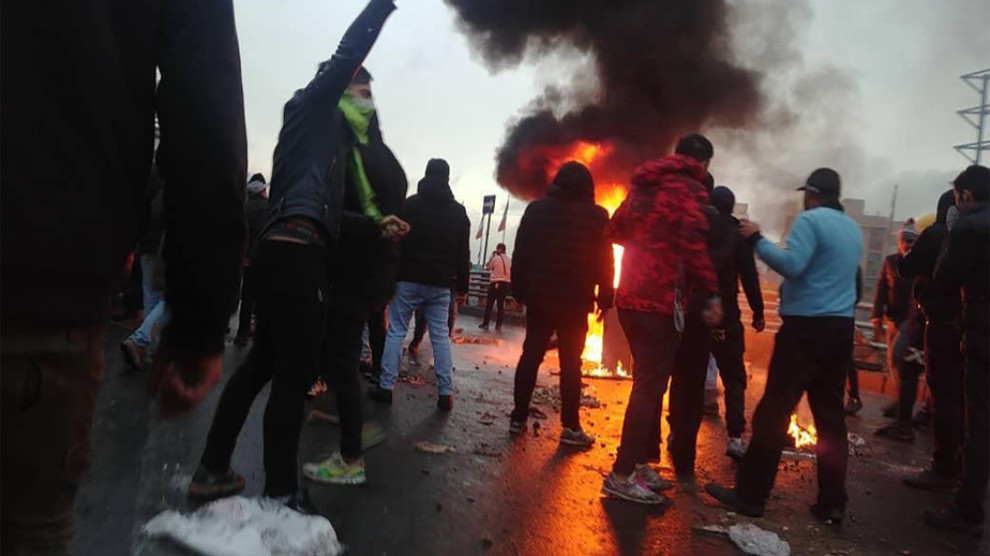AI: At least 304 killed, thousands injured in Iran
Thousands arbitrarily detained and at risk of torture in chilling post-protest crackdown in Iran, said the Amnesty International.
Thousands arbitrarily detained and at risk of torture in chilling post-protest crackdown in Iran, said the Amnesty International.

Iran’s authorities are carrying out a vicious crackdown following the outbreak of nationwide protests on 15 November, arresting thousands of protesters as well as journalists, human rights defenders and students to stop them from speaking out about Iran’s ruthless repression, said Amnesty International today.
The organization has carried out interviews with dozens of people inside Iran who described how, in the days and weeks during and following the protests, the Iranian authorities have held detainees incommunicado and subjected them to enforced disappearance, torture and other ill-treatment.
At least 304 people were killed and thousands were injured between 15 and 18 November as authorities crushed protests using lethal force, according to credible reports compiled by the organization. The Iranian authorities have refused to announce a figure for those killed.
“Harrowing testimony from eyewitnesses suggests that, almost immediately after the Iranian authorities massacred hundreds of those participating in nationwide protests, they went on to orchestrate a wide-scale clampdown designed to instill fear and prevent anyone from speaking out about what happened,” said Philip Luther, Middle East and North Africa Research Director at Amnesty International.
Video footage verified by Amnesty’s Digital Verification Corps, backed up by witness testimony, shows Iranian security forces opening fire on unarmed protesters who did not pose any imminent risk. The majority of the deaths that the organization has recorded occurred as a result of gunshots to the head, heart, neck and other vital organs indicating that the security forces were shooting to kill.
The UN has stated that it has information suggesting that at least 12 children are among those killed. According to Amnesty International’s research, they include 15-year-old Mohammad Dastankhah, who was shot in the heart in Shiraz, Fars province, as he passed by the protests on his way home from school, and 17-year-old Alireza Nouri, who was killed in Shahriar, Tehran province.
“Instead of continuing with this brutal campaign of repression, the Iranian authorities must immediately and unconditionally release all those who have been arbitrarily detained,” said Philip Luther.
“The international community must take urgent action, including through the UN Human Rights Council holding a special session on Iran to mandate an inquiry into the unlawful killings of protesters, horrifying wave of arrests, enforced disappearances and torture of detainees, with a view to ensuring accountability.”
Wave of mass arrests
On 17 November, the third day of protests, state media reported that more than 1,000 protesters had been arrested. On 26 November, Hossein Naghavi Hosseini, a spokesperson for Iran’s parliamentary committee for national security and foreign policy, said 7,000 people had been arrested. The authorities have yet to provide an official figure.
Several sources independently told Amnesty International that security forces are still carrying out raids across the country to arrest people in their homes and places of work.
Children as young as 15 have been detained alongside adults, including in Fashafouyeh prison, Tehran province, which is notorious for torture and other ill-treatment. Other places where detainees have been held are military barracks and schools.
Various government officials, including the Supreme Leader and the head of the judiciary, have labelled protesters as “villains” and “rioters” and associated protesters with foreign powers. State media has called for the death penalty to be used against protest “leaders”.
Also being targeted for arbitrary arrest and detention are journalists, students and human rights defenders, including minority rights and labour rights activists, and people from ethnic minority groups.
Journalist Mohammad Massa’ed was arrested on 23 November after posting a tweet about the near-total internet shutdown imposed by the authorities between 16 November and around 24 November. He was released on bail several days later.
Some prisons and detention centres are now reported to be experiencing severe overcrowding. On 25 November, the head of the city council of Rey in Tehran province expressed concern to reporters that Fashafouyeh prison is extremely overcrowded and has neither the capacity nor the facilities to accommodate such large numbers of detainees.